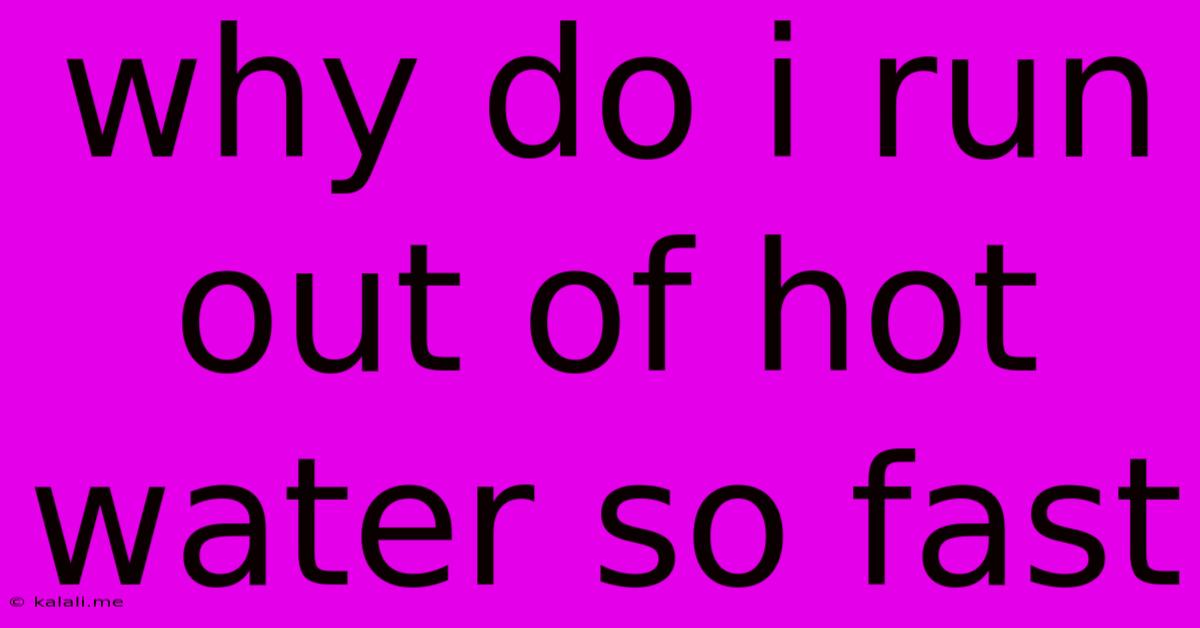Why Do I Run Out Of Hot Water So Fast
Kalali
May 27, 2025 · 4 min read

Table of Contents
Why Does My Hot Water Run Out So Fast? A Comprehensive Guide
Are you constantly battling lukewarm showers and frustrated by unexpectedly cold water? Running out of hot water too quickly is a common household problem, but thankfully, there are several reasons why this might be happening and solutions to help you reclaim those long, luxurious hot showers. This article will explore the most common culprits and provide practical troubleshooting steps to get your hot water system back on track.
Understanding Your Hot Water System: Before diving into the problems, it's helpful to understand the basic workings of your hot water system, whether it's a tankless water heater or a traditional tank water heater. Knowing the type you have will help you narrow down potential issues.
Common Reasons for Rapid Hot Water Depletion
Here are some of the most frequent reasons why your hot water seems to disappear faster than you'd like:
1. Low Water Heater Capacity: This is perhaps the most straightforward explanation. If your water heater's capacity (measured in gallons) is too small for the number of people in your household and your typical water usage patterns, you'll inevitably run out of hot water quickly. Consider the size of your family and your daily habits (long showers, frequent laundry, etc.) when evaluating the adequacy of your current system.
2. Faulty Thermostat: A malfunctioning thermostat might not be heating the water to the correct temperature, or worse, it might not be heating it at all. This can lead to you using more water than necessary to achieve the desired temperature, resulting in quicker depletion. Check your thermostat settings to ensure they're accurate and functioning correctly.
3. Sediment Buildup: Over time, sediment (minerals from your water supply) can accumulate at the bottom of a traditional tank water heater. This sediment acts as insulation, reducing the efficiency of the heating element and leading to slower heating and, ultimately, faster hot water depletion. Regular flushing of the tank is crucial to prevent this.
4. Leaking Hot Water Tank: A small leak in your water heater tank can lead to significant water loss over time, reducing the overall hot water available. Check for any signs of leaks around the tank, including dampness, rust, or puddles. A significant leak should be addressed by a professional immediately.
5. Multiple Hot Water Fixtures Running Simultaneously: If several hot water appliances or fixtures (showers, washing machines, dishwashers) are running concurrently, the demand on the hot water system will be significantly higher, leading to quicker depletion. Try to avoid running these appliances simultaneously, especially during peak usage times.
6. Inefficient Showerheads and Faucets: Older showerheads and faucets can consume significantly more water than newer, low-flow models. Replacing these with WaterSense-labeled fixtures can drastically reduce water consumption and extend the lifespan of your hot water.
7. Improper Water Heater Installation: If your water heater wasn't installed correctly, it might not be operating at peak efficiency. This could lead to a variety of problems, including rapid hot water depletion. Check that the water heater is properly vented and connected to the water supply.
8. Tankless Water Heater Issues: For tankless water heaters, problems can stem from insufficient gas or electricity supply, clogged filters, or a malfunctioning heating element. Regular maintenance and professional servicing are vital for these systems.
Troubleshooting and Solutions
Addressing the problem requires identifying the root cause. Start with the simplest solutions and progress to more involved ones.
- Check Your Thermostat Settings: Ensure your water heater is set to the desired temperature.
- Inspect for Leaks: Look for any signs of leaks around the water heater tank or pipes.
- Flush Your Water Heater (Tank-type only): This removes sediment buildup and improves efficiency. Consult your water heater's manual for instructions.
- Upgrade to Low-Flow Fixtures: Replace old showerheads and faucets with water-efficient models.
- Stagger Hot Water Usage: Avoid running multiple hot water appliances at the same time.
- Consider a Larger Water Heater: If your current system is simply too small, upgrading to a larger capacity might be necessary.
- Call a Professional: If you suspect a more serious problem, such as a faulty heating element or a significant leak, contact a qualified plumber or water heater technician.
By systematically investigating these potential causes and implementing the suggested solutions, you can significantly improve your hot water supply and enjoy longer, hotter showers. Remember, prevention is key – regular maintenance can help avoid many of these issues altogether.
Latest Posts
Latest Posts
-
Why Is Matthew 17 21 Missing
May 28, 2025
-
Great Minds Think Alike Fools Seldom Differ
May 28, 2025
-
Transfer Function Of A Bandpass Filter
May 28, 2025
-
How To Convert From Sop To Pos
May 28, 2025
-
How To Take A Photo Of A Screen
May 28, 2025
Related Post
Thank you for visiting our website which covers about Why Do I Run Out Of Hot Water So Fast . We hope the information provided has been useful to you. Feel free to contact us if you have any questions or need further assistance. See you next time and don't miss to bookmark.